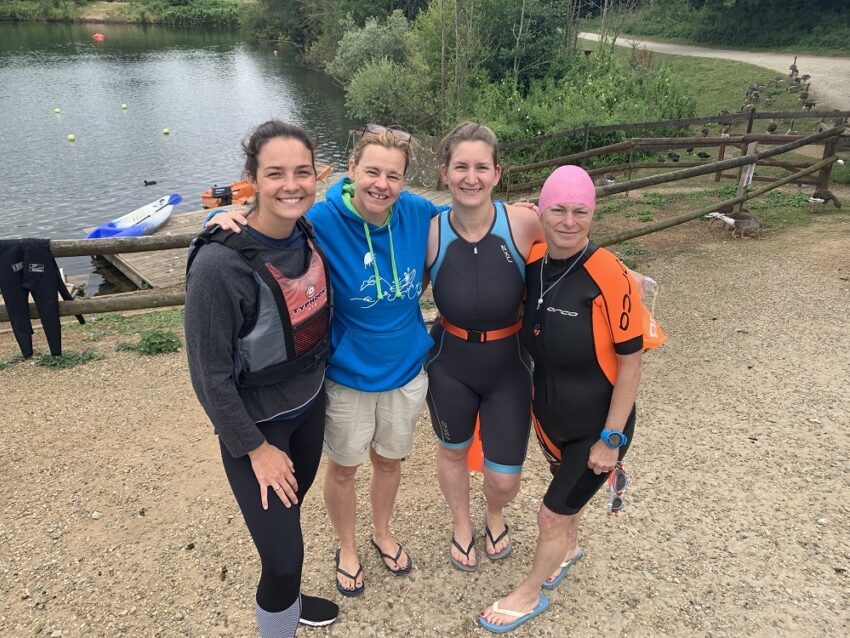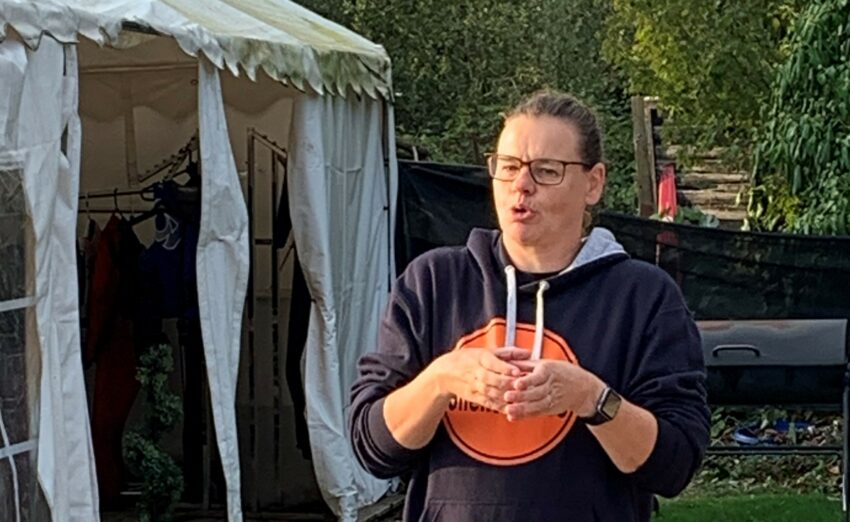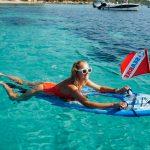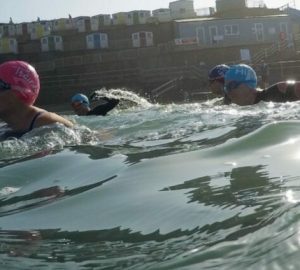Improving accessibility to outdoor swimming for deaf swimmers
By Caroline Hurley
All my life I have seen and experienced so many barriers to deaf swimmers. These created anxiety, frustration, and embarrassment to the point they would rather not participate due to these barriers. The main challenge is that deaf swimmers struggle to understand people and coaches, and communication failure was the basis of all the above anxiety and frustration.
Being deaf is an invisible disability. People usually walk by you as you look no different. A hearing person will only realise you cannot hear when they try to communicate with you. The deaf person may not speak clearly, which can add to the confusion. Not all deaf people cannot talk, some deaf people can speak perfectly clearly, due to becoming deaf at the later stage of their lives; however, they cannot hear you. There are many deaf people who love sport in general, as sport is a wonderful channel to relieve part of their frustration at being disabled and is a huge factor in maintaining strong mental health.
I have set up a swimming coach business called Swimming Without Barriers to campaign for accessibility for deaf people and to help give deaf people accessibility to open water swimming and enjoy swimming to the fullest. I provide swimming holidays, workshops and one-to-one coaching for deaf people. The need for this arose from my passion to support deaf people in achieving their swimming goals and dreams. This can be difficult elsewhere because of lack of funding to support deaf people. My business cuts having to pay a sign language interpreter to support us communicating, for example.
An example of where accessibility training would help massively is the following real scenario: a deaf person goes to attend a swimming event with many swimmers. The safety briefing, when to start, how to step in, how to follow the course is all done via an official using a loudspeaker. Deaf participants find it impossible to figure out what is going on. This causes anxiety, worry and generally an attitude of hoping for the best for deaf swimmers which hugely affects their potential as competitive swimmers regardless of their skill level. The following is a true story, one of the many events where this happens. There were three sisters, all amazing swimmers, one hearing and two deaf. At this particular event, they were split into different start waves. Then there was a last-minute announcement, saying that swimmers must not stop swimming after 3 miles but instead carry on from 3 to 5.25 miles without asking for help. The worst feeling for the hearing sister was that she wanted to let her sisters know, but didn’t know how.
When entering events, deaf people put will note their disability on the registration forms but generally nothing is taken into consideration. I once had to step in to arrange a sign language interpreter for a day when there were 11 deaf swimmers registered. I used my business’s account to pay for a sign language interpreter. Why should I pay and not the organiser? Simple things make a big difference. For example, it would be useful for organisers to email or text deaf people asking them what and how could they help them.
In order to help more deaf people achieve their swimming goals, I would like to attend courses to improve my teaching skills and to keep up with my Continuing Professional Development (CPD). I would like to see more deaf swimmers have to access to swimming coaching and courses more easily than before. I would be happy to advise and provide any information that may be required, for example, through deaf awareness workshops.
If you would like to contribute towards funding a bursary to support open water swimming for deaf people please donate here. The funding will help improve deaf awareness and support organisations to increase the accessibility for deaf people.
Let us see more and more deaf people get involved, I’m here to help you!
Case study: My experience of working with Keri-anne Payne

I would like to share my experience working with Keri-anne Payne for the benefit of the swimming community in general and hopefully shed some light on what a difference accessibility training could make to deaf swimmers to be included. As mentioned in my biography, I recently qualified as an open water coach with Keri-anne.
In a class there are usually several people, bantering, talking, and laughing. I was not able to follow what they were saying. This can make you slightly paranoid and worried you might look stupid. I explained to Keri-anne that I would love to become an open water swimming coach and that to get qualified I would need to book a British Sign Language interpreter to translate what was being said in the classroom, including the tutor’s lecture. For a full day course, I would need two sign language interpreters as the concentration span is 20 minutes and as a result the interpreters need to swap regularly to be able to provide all the information. Understandably, it is not possible for a private course provider to afford approximately £240 per interpreter per day.
Instead, Keri-anne kindly offered me one-to-one tuition, which was exceedingly kind of her. Then a good friend of mine, who I met at the Guildford 12 miles swim in 2018, offered her interpretation services. She works with deaf children at a deaf school as a communication support worker. She was willing to step in to support us with communication in her free time as a volunteer for the day. We met Keri-anne at her office in London. It went well over the two days. One the last day of the course, we needed to do a practical assessment with a group of 10 attendees. Luckily, my friend knew someone who wanted to do her evidence based interpreting qualification to become a qualified interpreter. She agreed to come and support the communication at the practical assessment with Keri-anne Payne in exchange for allowing her to use the day in support for her qualification. We created a film of her interpreting skills while she interprets for her assessment, and we didn’t have to pay her. To find her was like finding a needle in the haystack. I thought this opportunity would take six months, instead it was three days in one go – a small miracle for a deaf person trying to get this qualification.
Caroline Hurley – bio

Caroline Hurley has been profoundly deaf since birth. She started swimming age 10, when a friend’s mother took her to a local club, without asking her parents! She never looked back. Training twice a day with hearing peers and coaches, she went on to compete at the South Africa National Championships, finishing third in the 4 x 100m medley relay and top 15 in the 50m freestyle. Following that, she won a gold and three silvers at the Deaflympics at Sofia, Bulgaria, in 1993. She then switched to rowing, and rowed for South Africa coxless and coxed fours, touring Europe in 1999. Her interest in swimming continued however and now, living in the UK, she recently became an open water swimming coach through a course led by Keri-anne Payne. This enabled her to pursue her dream of making the sport more accessible to deaf swimmers through specific swimming workshops, holidays and coaching.







